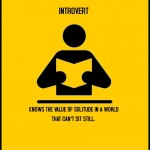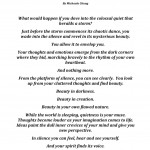The cultural ideal of extroversion, according to The Guardian, is evident in Western society. This includes every setting from school, where students are “repeatedly encouraged to join group activities, even if they would prefer not to,” to later professional settings and social settings. That being stated, it’s important to note that introversion is a healthy and viable personality trait as well.
The Huffington Post points out that people often have misconceptions about introversion, despite the fact that an estimated third of the world’s population are introverts. The primary difference goes beyond the more nuanced distinction of “shy vs. outgoing”. Rather, it is that “introverts are drained of energy by interaction, and gain energy in solitude and quiet, whereas extroverts gain energy in social situations with interaction.”
Being alone doesn’t have to mean lonely. Lonely people feel that they have no one they can talk to, even if something were wrong. Lonely people feel a distinct sense of missing someone, of wanting the company of another person, and this can be very psychologically distressing. However, being alone, and choosing some time in solitude to re-energize can be wonderfully restorative, healthy, creative, and productive.
So, if introverts recharge and restore their energy in solitude, let’s talk about some benefits we introverts gain from our time alone.
Read Books and Watch Films
Reading and TV/movie watching are great activities to do alone. Reading is a wonderfully productive and restorative thing to do alone with just peace and quiet. The same goes for watching TV. When you are alone, no one interrupts the storyline with questions; you don’t have to pause it for someone else’s bathroom break; you don’t have to argue about what to watch. You can take your pants off and relax.
Write, Paint, Sculpt, Sing
Undertaking artistic pursuits is best done in solitude. With fewer distractions and reminders of the outside world, introverts can access their rawest forms of creativity and really churn out some great work alone. Plus, as the Boston Globe wisely reminds us, “solitude has long been linked with creativity, spirituality, and intellectual might. The leaders of the world’s great religions—Jesus, Buddha, Mohammed, Moses—all had crucial revelations during periods of solitude.”
Meditate
Meditation is a simple, cheap, relatively quick way to relieve stress. Meditating in solitude is an extra effective way for introverts to recharge, bring themselves back to the present, be mindful of their bodies, and reduce negative emotion.
By using fMRI scans, scientists have been able to monitor brain activity during meditation. They’ve discovered that the brain dramatically slows down information processing as we meditate. Our frontal lobe, where reasoning and planning takes place, goes quiet. Our thalamus, the processor of sensory information, is less active. And our parietal lobe, which processes information about the surrounding world, goes for a coffee break. Our brain essentially goes into a state of rest. The benefits of resting our brain through meditation include: increased focus, reduced anxiety and greater peace of mind.











Hi Michaela!
sorry I have a question…
you say that if we respect to our nature we will be happy.I’m agree with you but “enjoy some me time “is against our nature,isn’t it?
Hi Maryam. I think everyone is wired to be able to enjoy time alone, where you focus on doing things you enjoy. Does that answer you question?
Sex and libido r not desires but instict…..none can avoid itg completely….lets go wid d flow
“And lest I forget the men”
I want to say nature choices the best during evolution.Male and female is nature’s prefer.If we want to be happy we should respect to nature.